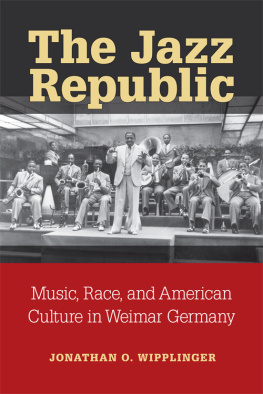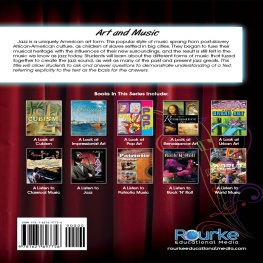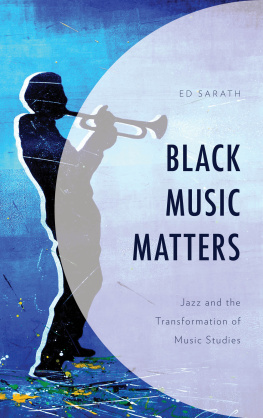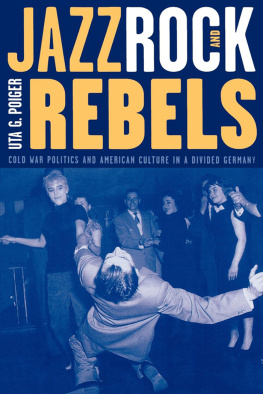Jonathan Wipplinger - The Jazz Republic: Music, Race, and American Culture in Weimar Germany
Here you can read online Jonathan Wipplinger - The Jazz Republic: Music, Race, and American Culture in Weimar Germany full text of the book (entire story) in english for free. Download pdf and epub, get meaning, cover and reviews about this ebook. year: 2018, publisher: University of Michigan Press, genre: Romance novel. Description of the work, (preface) as well as reviews are available. Best literature library LitArk.com created for fans of good reading and offers a wide selection of genres:
Romance novel
Science fiction
Adventure
Detective
Science
History
Home and family
Prose
Art
Politics
Computer
Non-fiction
Religion
Business
Children
Humor
Choose a favorite category and find really read worthwhile books. Enjoy immersion in the world of imagination, feel the emotions of the characters or learn something new for yourself, make an fascinating discovery.
- Book:The Jazz Republic: Music, Race, and American Culture in Weimar Germany
- Author:
- Publisher:University of Michigan Press
- Genre:
- Year:2018
- Rating:5 / 5
- Favourites:Add to favourites
- Your mark:
- 100
- 1
- 2
- 3
- 4
- 5
The Jazz Republic: Music, Race, and American Culture in Weimar Germany: summary, description and annotation
We offer to read an annotation, description, summary or preface (depends on what the author of the book "The Jazz Republic: Music, Race, and American Culture in Weimar Germany" wrote himself). If you haven't found the necessary information about the book — write in the comments, we will try to find it.
The Jazz Republic: Music, Race, and American Culture in Weimar Germany — read online for free the complete book (whole text) full work
Below is the text of the book, divided by pages. System saving the place of the last page read, allows you to conveniently read the book "The Jazz Republic: Music, Race, and American Culture in Weimar Germany" online for free, without having to search again every time where you left off. Put a bookmark, and you can go to the page where you finished reading at any time.
Font size:
Interval:
Bookmark:
 Page i
Page i 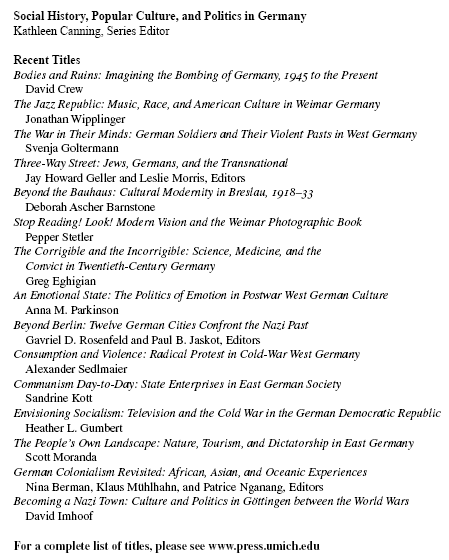 Page iii
Page iii Jonathan O. Wipplinger
University of Michigan Press
Ann Arbor
Page iv Copyright by Jonathan O. Wipplinger
All rights reserved
This book may not be reproduced, in whole or in part, including illustrations, in any form (beyond that copying permitted by Sections 107 and 108 of the U.S. Copyright Law and except by reviewers for the public press), without written permission from the publisher.
Published in the United States of America by the
University of Michigan Press
Manufactured in the United States of America
A CIP catalog record for this book is available from the British Library.
Library of Congress Cataloging-in-Publication Data
Names: Wipplinger, Jonathan O., author.
Title: The jazz republic : music, race, and American culture in Weimar Germany / Jonathan O. Wipplinger.
Description: Ann Arbor : University of Michigan Press, [2017] | Series: Social history, popular culture, and politics in Germany | Includes bibliographical references and index.
Identifiers: LCCN 2016046421| ISBN 9780472053407 (pbk. : alk. paper) | ISBN 9780472073405 (hardcover : alk. paper) | ISBN 9780472122660 (e-book)
Subjects: LCSH: JazzSocial aspectsGermanyHistory20th century. | JazzGermany19211930History and criticism. | GermanyCivilizationAmerican influences. | Music and raceGermany.
Classification: LCC ML3918.G3 W57 2017 | DDC 306.4/8425094309042dc23
LC record available at https://lccn.loc.gov/2016046421
Page v And now I have to tell you how it was back then, when the world, pretty much reaching its goal on the first try, had become jazz.
Hans Janowitz
This project has accompanied me now for more than ten years and across four institutions. Over this period, I have had more opportunities than I can recount to converse with scholars and colleagues about the subject of jazz music and popular culture in Germany during the 1920s. Their cumulative effect has helped shape The Jazz Republic. Even more so, without the collective support, guidance, and knowledge of friends and colleagues, The Jazz Republic simply would not have been completed. Throughout, Ive also been financially supported through a number of grants and stipends from the University of Michigan, North Carolina State University, and the University of Wisconsin-Milwaukee.
At both my current and previous institutions, senior colleagues in German have supported me to a degree that went far beyond the call of duty. Fittingly, they each share the first name Ruth. At North Carolina State, Ruth Gross was my department chair, a scholarly mentor, and simply a wonderful colleague. At Milwaukee, I have had the luck to be helped along and quite often lifted up by Ruth Schwertfeger: our conservations always left me with a smile on my face. I cannot thank each of them enough.
The following is an attempt to list, in no particular order other than alphabetical, some of those who have contributed to the current work over the years. My apologies in advance to anyone Ive forgotten: Vanessa Agnew, Kevin Amidon, Don Anderson, Paul Anderson, Naomi Andr, Kerstin Barndt, Vlad Bilenkin, Viktorija Bilic, Ulrich Biller, Stephen Bourne, Helga Braunbeck, Sylvia Schmitz-Burgard, Peter Cahn, David Choberka, Michael Cowan, Chip Deffaa, Bill Donahue, Andrew Donson, Michelle Eley, Carla Garner, Michael Garval, Karl Gert zur Heide, Daniel Golani, David Gramling, Jrgen Grandt, Jane Hawkins, Gabriele Hayden, Jrgen Heinrichs, Leroy Hopkins, Jochen Hung, Andrew Hurley, Catherine Kirchman, Lutz Kube, Alan Lareau, Priscilla Layne, Rainer Lotz, Jason Miller, Tobias Nagl, Nancy Nenno, Marc Pierce, Arnold Page x Rampersad, Don Rayno, Marc Reibold, Christian Rogowski, Andreas Schmauder, Michael Schmidt, Barbara Schoenberg, Laurence Senelick, John Sienicki, Meredith Soeder, Werner Sollors, Scott Spector, Noah Strote, Kira Thurman, Louise Toppin, Elisabeth Trautwein-Heymann, Simon Walsh, Silke Weineck, and Michelle Wright.
Special mention, though, is due to two independent researchers of jazz music and African American musicians in Germany and Austria: Hans Pehl and Konrad Nowakowski. Each of them has contributed greatly to the following project through collaboration, joint research, and sharing of their years of knowledge and expertise. They have each greatly enriched the project and their generosity has known no bounds; each read drafts of the manuscript and, in the process, contributed new information and eliminated any number of errors. Needless to say, any mistakes that remain are my own.
My research was also furthered through a number of archives and libraries in the United States and Germany. Generally, Id like to begin by thanking the interlibrary loan staff at both the University of Wisconsin-Milwaukee and at North Carolina State University for procuring almost every obscure request Ive made. In addition, Id also like to thank specifically: Akademie der Knste (Michael Schwarz), Beinecke Rare Book and Manuscript Library at Yale University, Center for Research Libraries in Chicago, Herzogin Anna Amalia Bibliothek Weimar (Dr. Hans Zimmermann), Hochschule fr Musik und darstellende Kunst in Frankfurt am Main (Dr. Andreas Odenkirchen), Institut fr Theaterwissenschaft of the Free University Berlin (Dr. Peter Jammerthal), Library of Congress, Moorland-Spingarn Research Center at Howard University, New York Public Library, Paul Whiteman Collection at Williams College, Schomburg Center for Research in Black Culture, Staatsarchiv Ludwigsburg of the Landesarchiv Baden-Wrttemberg, Staatsbibliothek Berlin, and the Theaterwissenschaftliche Sammlung of the University of Cologne.
To the University of Michigan Press and its entire staff, in particular LeAnn Fields, who has supported the project from the start, I am deeply grateful. I would like to thank the anonymous reviewers of the manuscript as well for their extremely useful comments.
Outside of academia, I have also been supported through my family, my mother and father as well as mother- and father-in-law and my entire extended family.
This book, though, is dedicated to my wife, Katie, and children, Charlotte, Grace, Josephine, and Isabelle. Any words here will not suffice to express what you mean to me, so Ill only say that without you, I would be lost.
Page xiThroughout this work, the word Black is capitalized when used in reference to people of African descent and the Black African diaspora in all cases except when occurring in direct citation. This usage is common though by no means universal in a variety of fields such as African American Studies and African Diaspora Studies. It is adopted here as a means of signaling these groups status as communities on par with other nationalities, peoples, etc., yet in a way that also attends to the diversity of Black peoples and cultures in the United States and globally, something especially important given the derogatory and dehumanizing language contained within some of my primary sources. The manuscript also uses African American in non-hyphenated form throughout for similar reasons and employs Black and African American synonymously where appropriate.
Page xii Page 1Sometime in the spring of 1925, a sixteen-year-old Berlin native, Alfred Lion, decided to spend a day at the
Font size:
Interval:
Bookmark:
Similar books «The Jazz Republic: Music, Race, and American Culture in Weimar Germany»
Look at similar books to The Jazz Republic: Music, Race, and American Culture in Weimar Germany. We have selected literature similar in name and meaning in the hope of providing readers with more options to find new, interesting, not yet read works.
Discussion, reviews of the book The Jazz Republic: Music, Race, and American Culture in Weimar Germany and just readers' own opinions. Leave your comments, write what you think about the work, its meaning or the main characters. Specify what exactly you liked and what you didn't like, and why you think so.

